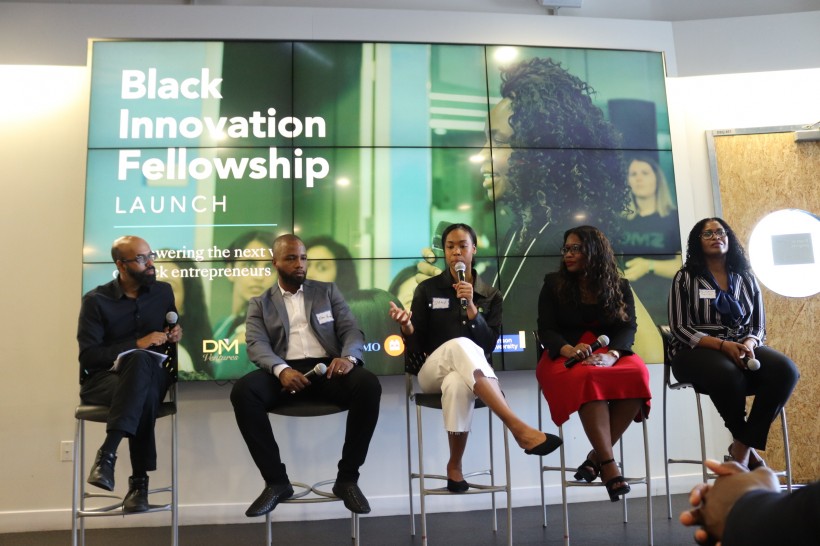As entrepreneurs from minority groups continue to be under-represented in the Atlantic Canadian startup community, Ryerson University’s DMZ accelerator is ramping up a new program aimed at supporting Black founders in Ontario.
The Black Innovation Fellowship, or BIF, launched in May and gives participants mentorship and other support as they work their way through the DMZ’s more generalized program offerings. Its strategy may offer an example of how a similar initiative could be implemented in Atlantic Canada.
BIF’s original goal was to support 10 black entrepreneurs a year for five years, but in response to unexpected levels of demand, the DMZ has secured additional financial backing and quintupled that number to 50 founders annually.
“We recognize that Black founders encounter a lot of challenges when it comes to starting and growing their businesses, from accessing seed capital to having fewer publicly recognized Black entrepreneurs and advisors to turn to,” said Vanessa Shiu, the DMZ’s manager of diversity and inclusion. “So we really wanted to create a space for Black entrepreneurs and founders to be able to thrive.”
BIF’s creation dates back to 2018. Isaac Olowolafe, founder of diversity-oriented venture capital firm Dream Maker Ventures, was distressed by the lack of support that he saw for Black entrepreneurs.
“He noticed that there was a lack of representation of Black founders, especially in tech and even at the DMZ,” said Shiu.
Olowolafe arranged for the DMZ to introduce a support program with backers that include Shopify, BMO and the Canadian Women’s Foundation.
Dream Maker is also the former employer of Danielle Graham, who now heads the Atlantic Women’s Venture Fund’s Sandpiper Ventures.
The DMZ’s main program offerings are an accelerator that helps companies with at least $20,000 in monthly recurring revenue scale up their sales and marketing activities, and an incubator for companies not yet far enough into the commercialization process to qualify for the accelerator.
BIF is intended to help counteract the hurdles that impede minority entrepreneurs from accessing funding and organizational backing, and make it more achievable for them to succeed in the DMZ’s main programs.
Entrevestor Data Shows Blacks, First Nations Under-Represented in Startups
Several Atlantic Canadian entrepreneurs from minority groups have written in Entrevestor that the local community needs to do more to support diverse founders.
According to Shiu, it has become clear that many of the Black entrepreneurs seeking help with growing their businesses have not yet progressed past the very early stages of starting a company and do not qualify for the DMZ’s incubator.
To help those founders prepare for full DMZ participation, BIF has rolled out a bootcamp that offers basic entrepreneurship training. Twenty-one companies have so far been accepted into the two-week program.
Shiu said that a key part of BIF, as well as the DMZ’s programming more generally, is matching entrepreneurs and funders with relevant knowledge or connections. For BIF participants, the DMZ also aims to match them with financial backers who are actively looking to partner with diverse founders.
She said that a potential renewal of BIF at the end of its current, five-year roadmap will depend on its success in the interim, as well as whether it continues to address an ongoing need in the innovation community.
“We recognize that we’re one program, but at the same time, we’re hoping that we’ll effect some changes and make an impact,” said Shiu. “If it’s something that is necessary for us to continue ... then definitely, we will continue.”
In the short term, she said that the feedback she has heard from the startup community is that COVID-19 may have exacerbated pre-existing issues with Black entrepreneurs struggling to find investors. But the Black Lives Matter protests in the United States and elsewhere have helped highlight the issues faced by the community.
“We just really encourage that VCs and funders looking at Black-owned businesses be intentional with their efforts and actions, and see how they can support those entrepreneurs,” said Shiu.
She added that the DMZ’s experiences with the program so far indicate that it is likely to be scalable to other regions, including Atlantic Canada, but warned that the details of each ecosystem make the specifics of such an expansion difficult to predict.










